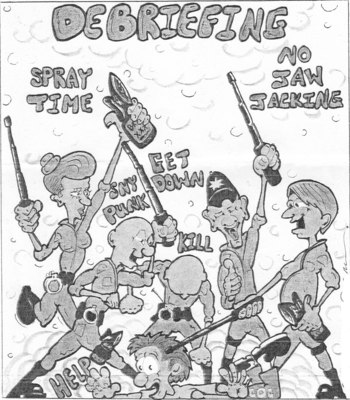
Organization vs. Validation: Oppose CDCR's "New" Proposal

I believe if the California comrades looked at the DOC’s model over here it would help in presenting a more productive model for them to use in reform. They used to be able to designate us at will with no evidence. Now it goes by a point system. A tattoo is not enough to designate you alone. And when you finish the program here, there’s no debrief. You just have a piece of paper of renunciation; no information is needed. They have found ways to corrupt this process, of course, but it is a step up from what California is doing to our comrades.
Our mission is to put an end to these methods altogether, but I believe there are steps in that process. Not only should we be giving a list of demands, but also presenting a model for reform that honors our human rights as well as our due process rights.
MIM(Prisons) responds: California Prison Focus, a reformist organization focused on issues related to SHU prisoners, recently put out an issue of their newsletter almost entirely devoted to analysis and criticism of California Department of Corrections and Rehabilitation’s (CDCR’s) proposal for a new gang validation system.(1) The CDCR’s proposal rests on a point system similar to the one used in Connecticut. A point system might make it more challenging for prison staff to frivolously send someone to a control unit indefinitely, but only if the evidence used to calculate the points is disclosed. Another key difference in the Connecticut DOC’s system is that it lacks a debriefing process, and is therefore not as self-perpetuating as the CDCR’s.
It may be a tactical advantage to model our reforms off of those which have led to some improvements in other localities. This would depend on the conditions in each location and time. A point system is slightly more objective than the CDCR’s earlier protocol of identifying just three pieces of evidence, which were often kept secret as “confidential.” But as Ed Mead reports in Prison Focus,
The stated purpose [of CDCR’s proposal] is still to “prohibit inmates from creating, promoting, or participating in any club, association, or organization, except as permitted by written instructions.”(1)
MIM(Prisons) stands in strong opposition to this stated goal of the CDCR in our efforts to support prisoners in organizing themselves for democratic rights as a class and for self-determination of the oppressed nations.
The U.$. government uses the domestic injustice system to justify the denial of democratic and Constitutional rights to a growing segment of its internal semi-colonies. The recent CDCR proposal refuses to eliminate the use of secret evidence to put people in SHU, which is a denial of due process. Meanwhile, not only is SHU used to punish people for associating with others, but the recent proposal includes plans to expand the range of Security Threat Groups targeted for repression. If these policies were implemented for the overall population we would call it fascism. Organizing strategies of our comrades behind bars should reflect this reality.
What is so sinister about the debriefing process, why it has been a primary target of the anti-SHU struggle, is because the statements given are used as secret evidence to put others in SHU for indefinite sentences, translating to years if not decades, in long-term isolation torture cells. As long as this continues, and as long as prisoners are denied basic First Amendment rights of association then we see no progress in the “new” proposal.
MIM(Prisons) calls for the abolition of long-term isolation, as it is a form of torture that destroys humyn beings. In addition, the way it is used attacks whole nations by targeting leaders of the oppressed and isolating them from the masses. There are reforms that could weaken the second effect, but people would still be tortured unless control units are abolished completely. The proposed point system barely puts a dent in either problem and can hardly even be considered a reform. Therefore we stand with the broad consensus among prisoners opposing the proposal, and call on supporters on the outside to do the same to remove all legitimacy from the government’s attempts to keep the oppressed from organizing for any purpose.
Campaign info:
California Strike Against Torture in Prisons - 8 July 2013
Related Articles:This article referenced in:








